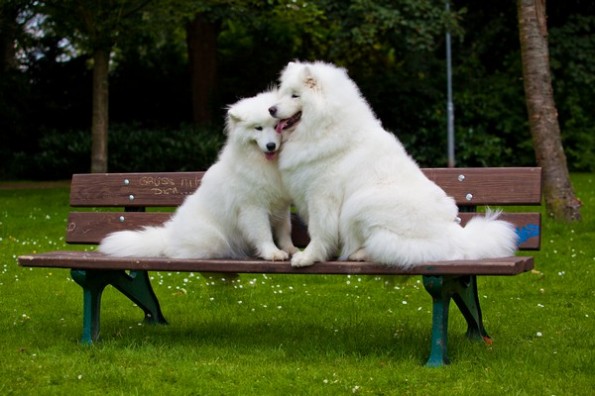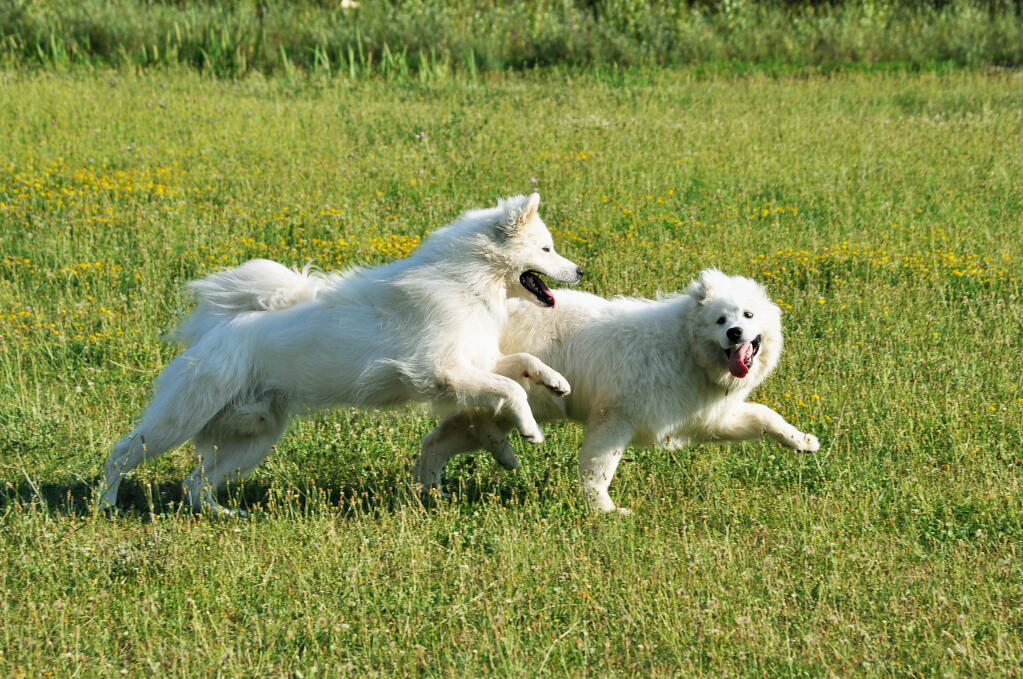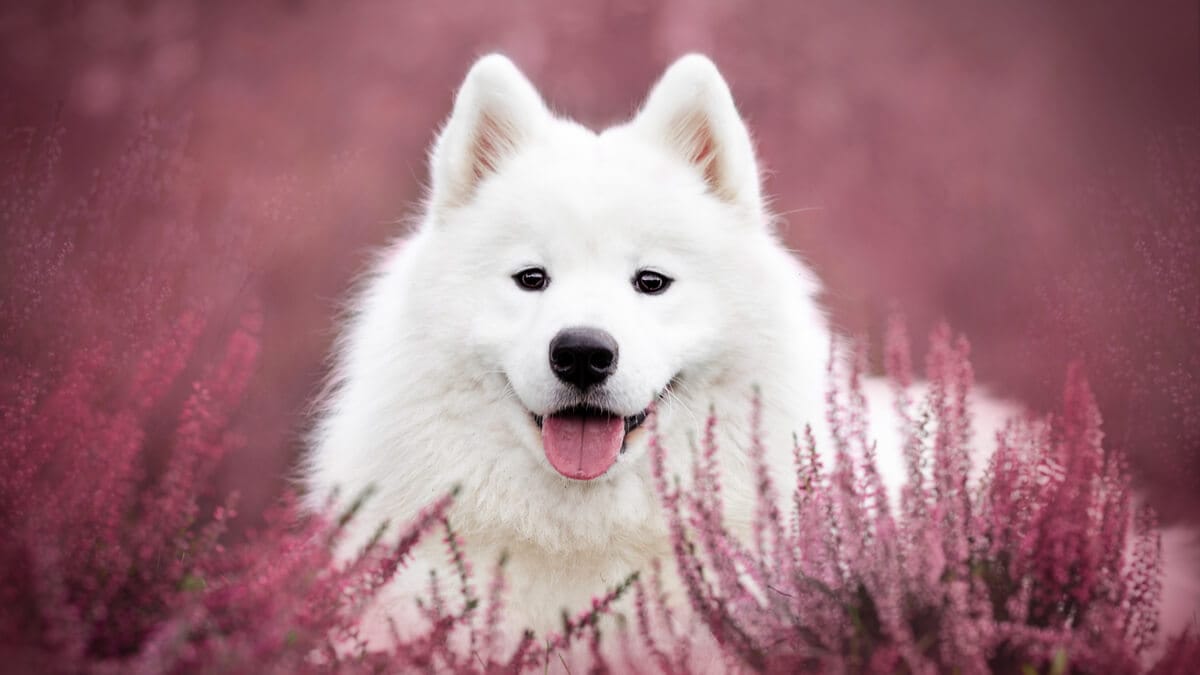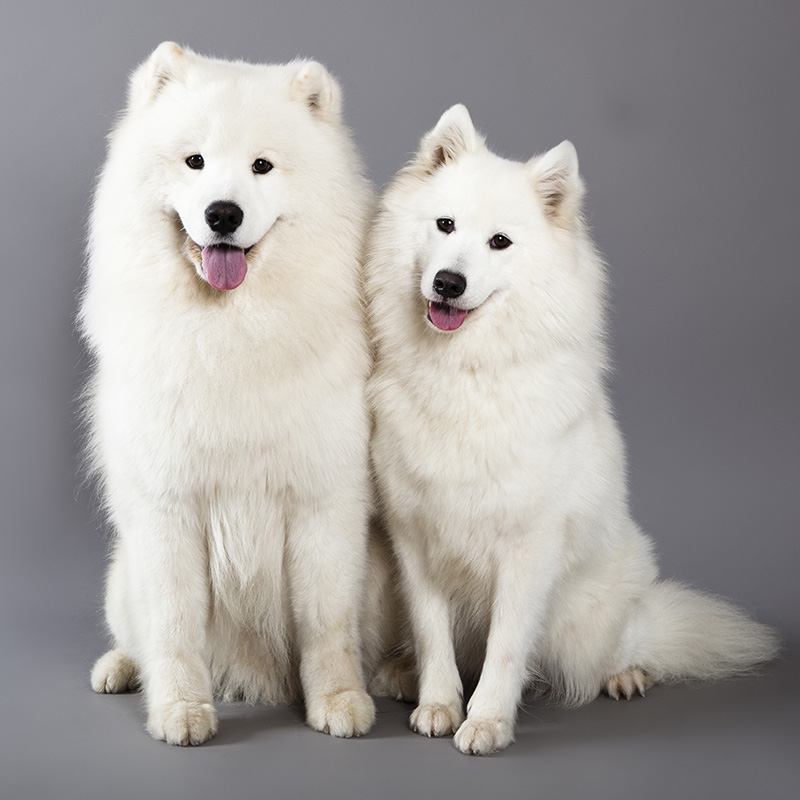The Samoyed is a friendly and beautiful breed of dog that originated from Siberia. With their thick, white coats and upward-curling smiles, Samoyeds make for great companions and family pets. Read on to learn more about this playful breed.
Overview of the Samoyed Breed

Samoyeds were originally bred by the Samoyedic people of Siberia to herd reindeer, pull sleds, and keep their families warm. The breed gets its name from this nomadic tribe. These days, Samoyeds are popular pets and show dogs across the world.
Some quick facts about Samoyeds:
- Size – Samoyeds are medium to large dogs, standing 21-24 inches tall and weighing 35-65 pounds
- Coat – Double layered coat that is thick, white, and straight. The coat insulates them from extreme Arctic temperatures.
- Temperament – Friendly, gentle, playful, and intelligent
- Lifespan – 12-14 years
Appearance
The Samoyed has a beautiful, white, double-layer coat. The outer layer has longer, straight hairs while the undercoat is soft and thick. Their coats can range from a pure glistening white to a light cream.
These dogs have a broad head that tapers to the muzzle. Their ears are small and triangular, set high on the head. They have medium sized, dark brown almond-shaped eyes.
One of the most distinctive features of the Samoyed is its “Sammy smile” – the upturned corners of their mouth that make them look like they are smiling.
Temperament
Samoyeds are known for being friendly, gentle, and loving dogs. Despite their size, they aren’t aggressive at all. Samoyeds form close bonds with their families and thrive when included in activities.
These energetic pups need regular exercise and attention. They love to play and have a mischievous streak, keeping their families entertained. Their playful and good-natured personality also makes them great dogs for households with older children.
With early socialization and training, Samoyeds get along very well with people and other dogs. Their gentle nature allows them to be trusted around children as well, provided supervision is maintained.
Grooming and Care
- Brushing – Samoyeds require regular, thorough brushing to prevent matting and manage shedding
- Bathing – Bathe every 1-3 months using proper grooming tools and dog shampoo
- Nails – Nails should be trimmed when long to avoid overgrowth and splitting
- Ears – Floppy ears should be checked and cleaned weekly to prevent infections
- Teeth – Brush their teeth using dog toothpaste to promote oral health
As an Arctic dog breed, Samoyeds are prone to heat sensitivity and should be kept cool. Avoid shaving their coat which can damage the way it regulates temperature. Their activity levels mean they need a lot of exercises and mental stimulation as well.
Overall, Samoyeds make for friendly and playful additions to active families. They are gentle while still being energetic, fun dogs requiring regular attention and grooming.
Samoyed Dogs for Sale – Cost and Breeders

Samoyed puppies can cost anywhere from $800 to as much as $10,000 based on factors like bloodlines, breeder reputation, location, gender etc.
On average, Samoyed puppies from reputable breeders can cost around $2,000 to $3,500.
What Affects Samoyed Prices?
Several things influence the cost of a Samoyed puppy:
- Bloodlines – Samoyed from championship bloodlines can be far more expensive
- Breeder reputation – Well established breeders charge higher prices
- Gender – Male Samoyed puppies tend to cost more than females
- Coat color – Rare or unique coats like cream can increase price
- Location – Puppies sold in high demand areas are higher priced
Make sure you buy from a responsible, ethical breeder to get a healthy Samoyed puppy. Avoid pet stores or backyard breeders.
Ask breeders questions about parent dog health tests, genetic conditions in bloodline, socialization practices etc. to ensure you get a high quality pup.
Finding Samoyed Breeders
There are many online sites and clubs to help you locate reputable local Samoyed breeders such as:
Vet references, show records, health tests, and meeting parent dogs in-person are some vital things to confirm with the breeder.
Once you connect with a breeder have a consultation, submit an application, sign contracts before bringing your Samoyed puppy home.
Adopting a Samoyed
If interested in adopting an adult or retired Samoyed you can check local rescues or adoption sites such as:
Adoption can cost $50 to $500 depending on the shelter and covers medical expenses for the dog. Since their history is sometimes uncertain, adopting a Samoyed comes with more risk than buying a puppy. However it allows experienced owners to provide a loving home to dogs in need.
Caring for your Samoyed

Bringing home your Samoyed puppy is very exciting. However there are lots of responsibilities that come with caring for them as well.
Exercise and Activity
Samoyeds have high activity levels and need 30-60 minutes of exercise daily. Without enough exercise they can become anxious or destructive.
The best Samoyed dog activities include:
- Long walks
- Hiking
- Playing games like fetch
- Agility training
- Sledding (they love it!)
Make sure your Samoyed gets both mental and physical exercise. Puzzle toys and training sessions are great ways to stimulate their minds too.
As working dogs, Samoyeds tend to thrive when given “jobs” to fulfill. Even simple tasks like carrying small items on walks taps into their natural instincts. Staying active is key for a well-rounded and tired out Samoyed.
Training and Socializing
Despite their friendly nature, early socialization and training is vital for raising healthy, obedient Samoyeds. Sign them up for puppy kindergarten classes soon after their vaccines.
Use positive reinforcement training with regular 15 minute sessions to establish good manners, impulse control, and skills like house training.
Key things to train your Samoyed puppy:
- House training – Crate training recommended
- Basic commands – Sit, stay, come etc.
- Loose leash walking – Helps leash manners during walks
- Bite inhibition – Teaches them to be gentle
- Socialization – Safely introduce them to people, places and other pets
Raising your Samoyed puppy properly lays the foundation for a well adjusted adult dog. Consider investing into professional training if you need extra guidance.
Grooming and Coat Care
The Samoyed’s thick coat requires weekly grooming to prevent matting and control shedding. Brushing 2-3 times a week is a must.
Bathing can happen once every 1-3 months using proper shampoo and techniques best suited to their undercoat. Pay special attention to dense areas like the neck and behind the ears which are prone to tangles.

Their nails should be trimmed regularly as well to maintain their shape and length. Clean inside their ears weekly checking for discharge or redness indicating infection. Brush their teeth daily or several times a week with vet approved dog toothpaste.
Shedding can be kept under control through regular brushing and a Samoyed specific diet rich in Omega fatty acids. Never shave off your Samoyed’s coat as this can irreversibly damage their coat’s texture and temperature regulation ability.
If you stay committed to the demanding grooming routine, Samoyeds can make tidier indoor pets. Outdoor housing may also be easier to manage with their heavy seasonal shedding cycles in warmer months.
Feeding and Nutrition
As large, energetic dogs Samoyeds need high quality diets to fuel their activity levels and support healthy development. Feeding them an appropriate dog food is very important.
Samoyed puppies can be fed 3-4 small meals while adults do well on 2 daily feedings. Follow label instructions based on your individual dog’s age, size and activity level.
Make sure their diet includes:
- 25% protein
- 14% fat minimum
- Glucosamine/chondroitin for joint health
- Omega fatty acids for skin and coat
Avoid overfeeding treats and stick to measured meal portions appropriate for their size.
Health Issues
While Samoyeds are generally healthy as a breed, potential health risks include:
- Hip and elbow dysplasia
- Eye disease like glaucoma
- Hypothyroidism
- Diabetes
- Allergies
Reputable breeders will screen parent dogs for conditions like dysplasia and have records of health testing they’ve performed.
As a prospective owner you should also familiarize yourself with common health issues for the breed. Look into your puppy’s genetic health guarantee and pet insurance plans early on.
Conclusion
Overall Samoyeds make wonderful pets given their playful and friendly nature. They require extensive grooming and plenty of activity which makes them best suited to active households. If you put in the effort to properly care for and train your Samoyed, they make delightful, charming companions.